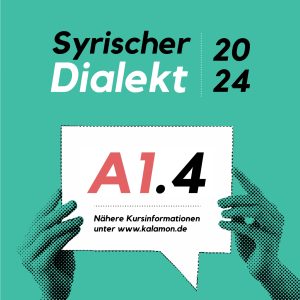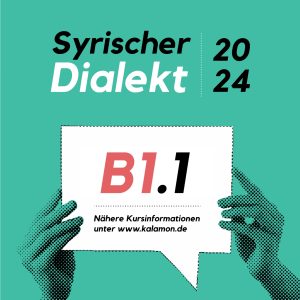[:de][:de]Da man im Alltag kein Hocharabisch spricht, empfiehlt es sich, den syrischen Dialekt zu
lernen. „Syrischer Dialekt“ gilt als Überbegriff für die sehr ähnlichen Dialekte in Syrien,
PaläsJna, Libanon und Jordanien und wird überall in der arabischen Welt verstanden.
Die
Mehrheit der Araber in Berlin spricht ebenfalls diesen Dialekt, so dass man die Sprache auch
im Berliner Alltag üben und einsetzen kann.
Hocharabisch Lernende haben häufig Schwierigkeiten im Kontakt mit arabischsprachigen
Menschen, weil diese meistens nicht hocharabisch antworten, sondern im Dialekt. Ein
Dialektkurs wird daher besonders denjenigen empfohlen, die in der Sozialarbeit, Pädagogik,
als Ärzte oder für HilfsorganisaJonen arbeiten. So können sie spontan in Alltagssituationen
helfen bzw. reagieren und eine tragfähige Vertrauensbasis aufbauen.
Voraussetzungen:
Abgeschlossener A1.3 Kurs (syrischer Dialekt) oder für den Kurs ausreichende Vorkenntnisse.
Wir bieten die Möglichkeit auf Einstufung des Niveaus an.
Lernziel:
Am Ende des Kurses haben Lernende die sprachliche Kompetenz, über Berufe und
Hobbys zu sprechen. Sie können außerdem Verabredungen treffen.
Grammatik:
In diesem Sprachniveau behandeln wir:
Verbkonjugation der Gegenwart und Vergangenheit (Wiederholung und VerJefung)
Superlativ
Nebensätze
Personalsuffixe am Verb
[:en]Since one does not speak Standard Arabic in everyday life, it is advisable to use the Syrian dialect
learn. “Syrian dialect” is an umbrella term for the very similar dialects in Syria,
Palastien, Lebanon and Jordan and is understood throughout the Arab world.
The
Majority of Arabs in Berlin also speak this dialect, so you can use the language too
can practice and use everyday life in Berlin.
Learners of Standard Arabic often have difficulty in contact with Arabic speakers
People, because they usually don’t answer in high Arabic, but in dialect. One
Dialect course is therefore particularly recommended for those who are involved in social work, pedagogy,
work as doctors or for aid organizations.
So you can spontaneously in everyday situations
help or react and build a stable basis of trust.
Requirements:
Completed A1.3 course (Syrian dialect) or previous knowledge sufficient for the course.
We offer the possibility of grading the level.
Learning objective:
At the end of the course, learners will have the language skills, professions and
Hobbies to talk about. You can also make agreements.
Grammar:
In this language level we treat:
• Verb conjugation of the present and past (repetition and defection)
• Superlative
• Subordinate clauses
• Personal suffixes on the verb
[:ar][:ar]
بما أن اللغة العربية الفصحى لا يتم التحدث بها في الحياة اليومية ، فمن المستحسن تعلم اللهجة السورية. “اللهجة السورية” هو مصطلح شامل لللهجات المتشابهة جدًا في سوريا وفلسطين ولبنان والأردن ويتم فهمها في جميع أنحاء العالم العربي. كما أن معظم العرب في برلين يتحدثون هذه اللهجة أيضًا ، مما يسمح لك بممارسة اللغة واستخدامها في الحياة اليومية في برلين أيضًا.
غالبًا ما يواجه متعلمو العربية الفصحى صعوبات في التواصل مع الناطقين بالعربية ، لأن هؤلاء الأشخاص عادة لا يجيبون باللغة العربية الفصحى ، بل باللهجة. لذلك ، يوصى بشدة بدورة في اللهجة السورية لأولئك الذين يعملون في مجال العمل الاجتماعي والتربية ، ويعملون كأطباء أو لمنظمات الإغاثة. وبالتالي ، يمكنك المساعدة أو الرد بشكل عفوي في المواقف اليومية وبناء أساس ثقة قوي. المتطلبات:
• إكمال دورة A1.3 (اللهجة السورية) أو معرفة كافية باللغة العربية كافية للدورة.
• نحن نقدم إمكانية تصنيف المستوى.
الهدف من التعلم:
• في نهاية الدورة ، سيكون لدى المتعلمين المهارات اللغوية والمهن والهوايات للتحدث عنها. يمكنك أيضًا إجراء اتفاقيات.
القواعد النحوية:
• في هذا المستوى اللغوي ، نعالج ما يلي:
• تصريف الأفعال في المضارع والماضي (التكرار والعيوب)
• تفوق
• جمل تابعة
• لاحقات شخصية على الفعل
[:][:][:][:en]Since one does not speak Standard Arabic in everyday life, it is advisable to use the Syrian dialect
learn. “Syrian dialect” is an umbrella term for the very similar dialects in Syria,
Palastien, Lebanon and Jordan and is understood throughout the Arab world.
The
Majority of Arabs in Berlin also speak this dialect, so you can use the language too
can practice and use everyday life in Berlin.
Learners of Standard Arabic often have difficulty in contact with Arabic speakers
People, because they usually don’t answer in high Arabic, but in dialect. One
Dialect course is therefore particularly recommended for those who are involved in social work, pedagogy,
work as doctors or for aid organizations.
So you can spontaneously in everyday situations
help or react and build a stable basis of trust.
Requirements:
Completed A1.3 course (Syrian dialect) or previous knowledge sufficient for the course.
We offer the possibility of grading the level.
Learning objective:
At the end of the course, learners will have the language skills, professions and
Hobbies to talk about. You can also make agreements.
Grammar:
In this language level we treat:
• Verb conjugation of the present and past (repetition and defection)
• Superlative
• Subordinate clauses
• Personal suffixes on the verb
[:ar]
بما أن اللغة العربية الفصحى لا يتم التحدث بها في الحياة اليومية ، فمن المستحسن تعلم اللهجة السورية. “اللهجة السورية” هو مصطلح شامل لللهجات المتشابهة جدًا في سوريا وفلسطين ولبنان والأردن ويتم فهمها في جميع أنحاء العالم العربي. كما أن معظم العرب في برلين يتحدثون هذه اللهجة أيضًا ، مما يسمح لك بممارسة اللغة واستخدامها في الحياة اليومية في برلين أيضًا.
غالبًا ما يواجه متعلمو العربية الفصحى صعوبات في التواصل مع الناطقين بالعربية ، لأن هؤلاء الأشخاص عادة لا يجيبون باللغة العربية الفصحى ، بل باللهجة. لذلك ، يوصى بشدة بدورة في اللهجة السورية لأولئك الذين يعملون في مجال العمل الاجتماعي والتربية ، ويعملون كأطباء أو لمنظمات الإغاثة. وبالتالي ، يمكنك المساعدة أو الرد بشكل عفوي في المواقف اليومية وبناء أساس ثقة قوي. المتطلبات:
• إكمال دورة A1.3 (اللهجة السورية) أو معرفة كافية باللغة العربية كافية للدورة.
• نحن نقدم إمكانية تصنيف المستوى.
الهدف من التعلم:
• في نهاية الدورة ، سيكون لدى المتعلمين المهارات اللغوية والمهن والهوايات للتحدث عنها. يمكنك أيضًا إجراء اتفاقيات.
القواعد النحوية:
• في هذا المستوى اللغوي ، نعالج ما يلي:
• تصريف الأفعال في المضارع والماضي (التكرار والعيوب)
• تفوق
• جمل تابعة
• لاحقات شخصية على الفعل
[:]
Showing all 2 results
-

A1.4 Syrian dialect – In Person (Neukölln)
€190 – €230
Select options This product has multiple variants. The options may be chosen on the product page -

B1.1 Syrian dialect – In Person (Neukölln)
€190 – €230
Select options This product has multiple variants. The options may be chosen on the product page
